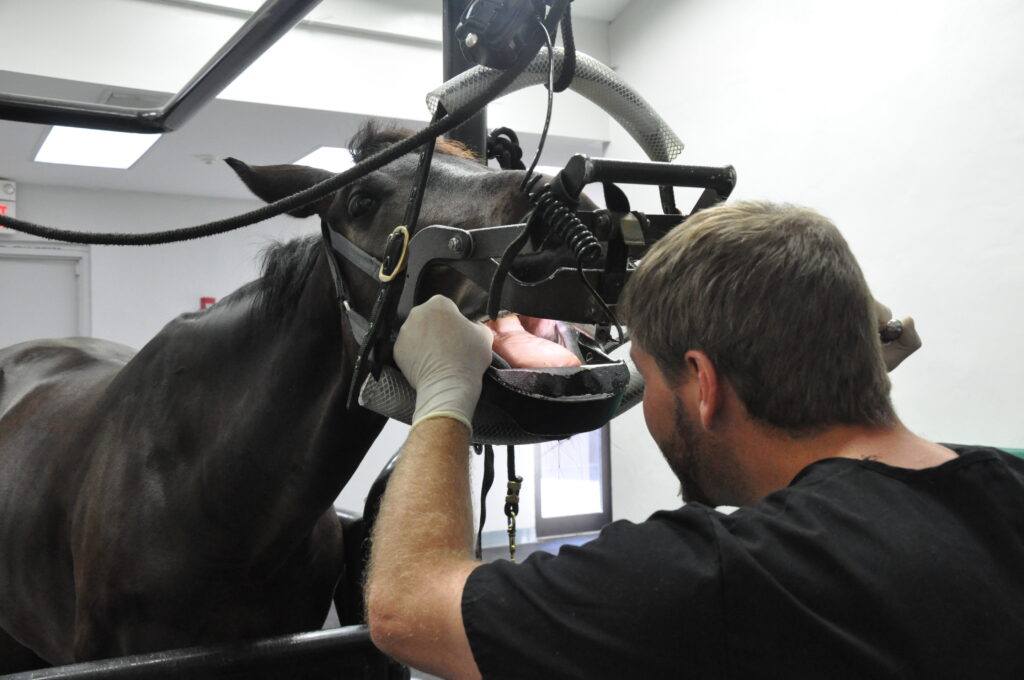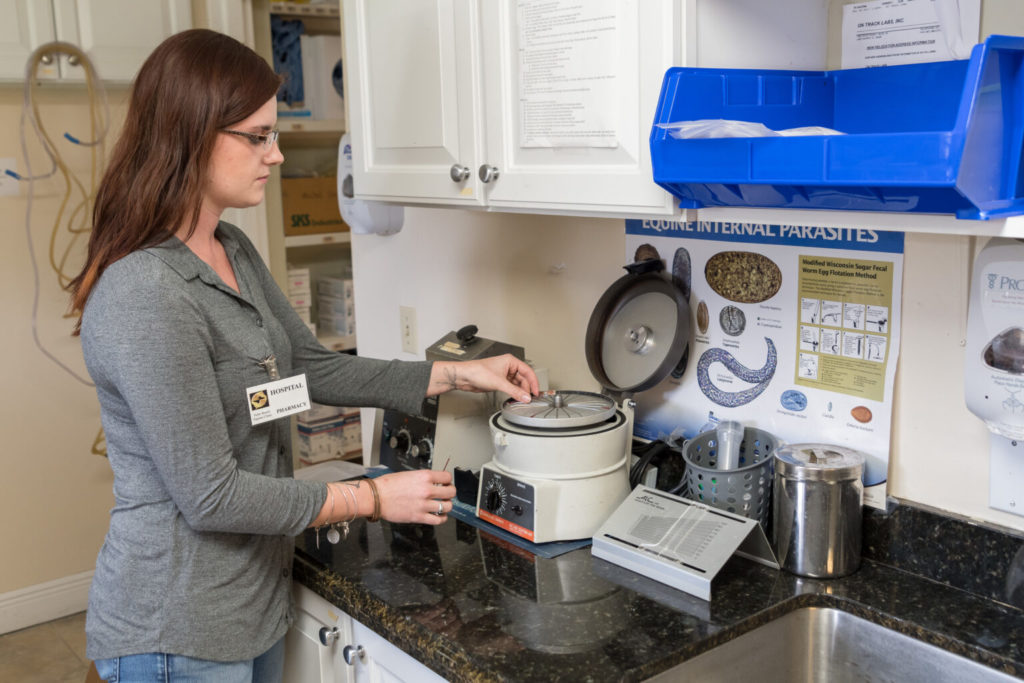Palm Beach Equine Clinic provides considerations for your aging performance horse. Words by Ben Lawler of Palm Beach Equine Clinic.
From a veterinary perspective, horses can be considered “middle-aged” by 13 years of age, and “seniors” by 20 years of age. Although many sport horses may just be coming into their prime for training and competing during these years, horses show signs of aging at different rates just like humans do. As horses age some physiological functions start to decline, and they require extra care to maintain their overall health and condition.
Advances in diagnostics, therapies, and medications can help to support equine athletes and keep them performing well into their golden years. While many of the same health factors apply to horses of all ages, several additional and significant concerns should be considered for the aging horse.
Meet Your Horse’s Nutritional Needs
 Aging impacts a horse’s ability to digest and utilize the nutrients in its feed as well as its ability to maintain weight and muscle mass. Senior horses require a diet that is highly digestible, palatable, and has an amino acid profile that will maintain muscle mass. As diet is one of the most crucial facets of a horse’s care, owners can consult their veterinarian to make sure they are fueling their aging horse with an adequate ratio and amount of high quality of forage, grains, vitamins, and minerals.
Aging impacts a horse’s ability to digest and utilize the nutrients in its feed as well as its ability to maintain weight and muscle mass. Senior horses require a diet that is highly digestible, palatable, and has an amino acid profile that will maintain muscle mass. As diet is one of the most crucial facets of a horse’s care, owners can consult their veterinarian to make sure they are fueling their aging horse with an adequate ratio and amount of high quality of forage, grains, vitamins, and minerals.
“When it comes to the best nutrition for senior horses, access to high-quality forage is very important and some horses may need free-choice quality hay to maintain optimum health,” said Dr. Marilyn Connor of Palm Beach Equine Clinic. “There are many commercially available feeds labeled as “senior” that are formulated to meet the dietary needs of the middle age to senior horse. These feed products are often beneficial to all adult horses as they are processed to be nutrient dense and highly digestible.”
There are many additional factors that go hand-in-hand with feeding a senior horse, such as minimizing the risks of colic and ensuring the best dental health. A veterinarian will be able to advise the owner if their senior’s diet is meeting the horse’s needs and setting them up for success in the years to come.
Be Mindful of Dental Health
The digestion process begins in the mouth, so maintaining good dental health is imperative. Equine teeth, unlike human or a small animal teeth, will continue to grow throughout the horse’s life. An annual dental exam by a veterinarian will go far in preventing and fixing sharp points, hooks, chipped or fractured teeth, or damage to soft tissue within the mouth.
“Another condition more common in geriatric horses is Equine Odontoclastic Tooth Resorption and Hypercementosis (EOTRH). This condition affects the incisors and occasionally the canine teeth and can be very painful. Often times, EOTRH can be recognized as irritability, head shyness, or if the horse struggles to bite treats like carrots. We can make a definitive diagnosis of this through taking radiographs,” continued Dr. Davis.
 Photo by Palm Beach Equine Clinic.
Photo by Palm Beach Equine Clinic.
Monitor Internal Health
Older horses are more prone to developing endocrine diseases such as Equine Metabolic Syndrome (EMS) or Pituitary Pars Intermedia Dysfunction (PPID or Cushing’s disease). These diseases can lead to progressive deterioration of healthy tissue and have major negative effects on almost every bodily system in the horse. A horse with unmanaged PPID is more likely to experience episodes of laminitis, chronic infections, anhidrosis, and infertility, as well as career-ending soft tissue injuries. Research indicates that between 20 to 30 percent of horses over the age of 13 have PPID, many with no clinical signs making the disease go unnoticed.
Routine blood tests, such as a Complete Blood Count (CBC) or Serum Chemistry analysis are useful in identifying changes to the horse’s red and white blood cell counts (to see if they may be anemic) and to assess internal organ function. Having your horse tested every six to 12 months will be helpful for tracking and detecting any changes in their health and implementing treatment early on.
Immune system function also gradually declines with age, making middle-age and senior horses more susceptible to illnesses. It is important for owners to stay vigilant and up to date on their horse’s core vaccines, and to consult their veterinarian about timing and frequency of boosters to make sure their horse is protected.
 Photo by Jump Media.
Photo by Jump Media.
Palm Beach Equine Clinic also recommends routine fecal testing to evaluate the horse’s internal parasite count and implementing a consistent deworming program. This is imperative for clients based in Florida year-round due to the lack of frost which usually kills many parasite eggs in northern climates. Fecal egg count testing should be performed twice per year, in the spring and fall, to assess parasite load in the intestines. It is important to note that not all parasites are susceptible to every deworming product, and the results of a fecal test will give the veterinarian insights as to the type of parasites and which dewormer is best to administer for that unique horse. Palm Beach Equine Clinic veterinarians have access to the laboratory equipment onsite to run the vast majority of these tests for rapid same day results.
About Palm Beach Equine Clinic
Established in 1981, Palm Beach Equine Clinic has earned a reputation across the nation and around the globe for exceptional equine healthcare. Founded by Dr. Paul Wollenman and lead by President Dr. Scott Swerdlin, the practice has grown from modest means to a full-service equine hospital with over 35 veterinarians and substantial support staff.
Palm Beach Equine Clinic offers a diverse team of distinguished veterinarians located across the country and abroad. The team is complete with board-certified surgeons and internists and treats a wide range of patient needs. Many Palm Beach Equine Clinic veterinarians have specialized in certain areas of medicine such as sport horse lameness, dentistry, reproduction, acupuncture, nutrition and more. Veterinarians are supported by the latest medical technologies in magnetic resonance imaging, nuclear scintigraphy, ultrasonography, radiography and computed tomography. For more information, click here.
